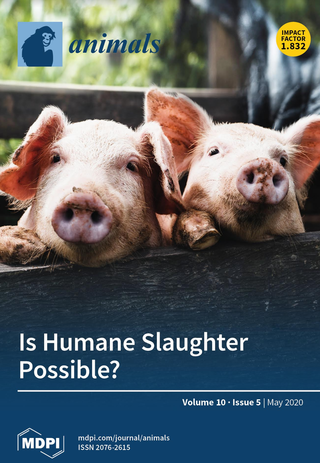Happiness
Is Animal Slaughter Defensible?
A response to an anonymous commenter.
Posted August 25, 2020
In my recent article, I discussed a paper I published in the journal Animals on whether humane animal slaughter is possible. Since I have received numerous replies, I would like this opportunity to answer the questions that have been raised and the criticism that has been uttered against my position.

Context: I have defended the claim that animal slaughter can never be truly humane since animals will inevitably lose the possibility of future welfare (consisting of pleasure and other positive affective states such as excitement) if they are killed prematurely.
Comment 1:
"Shouldn't the standard be more humane than a natural death for these animals? Comparing the slaughter to the expected natural death of their closest wild relative (since many farm animals would not survive in the wild due to breeding of traits that would be incompatible with fleeing predators etc) seems like a more reasonable standard than doing no harm, which as you point out is impossible."
Walter Veit: This position is a sensible one! I think it is a good idea to orient ourselves on the "wild lives" of animals to at least achieve a certain benchmark level at which animals in slaughterhouses would have a better life and a better death — implying that their lives would be longer.
As animal ethicists have long criticized, this is not the case for many animals living under such conditions. It would definitely be an improvement that I am willing to endorse.
However, I am reluctant to take it one step further to assert that the practice has now become unproblematic. That we should go as far as to call such a standard "humane." These animals are under our care and it is entirely in our hands to which extent their lives will be good ones. We are not merely taking them out of the wild in order to place them into better living conditions (in which case this argument would work better). Instead, we are deliberately creating animals to use them as food and other kinds of resources.
This, I think, comes with special obligations not unlike those of parents who decide to bring a human child into the world.
Is it really enough to ensure that our child is above what is currently considered to be the natural or average level of welfare/happiness in children?
I have my qualms with the idea that animals or children owe their creators for having lives that are minimally happy. Yes, I agree — these animals would probably have lives worth living and lives that are in a minimal sense enjoyable. But is that all parents want for their children? To be so happy that they would consider their lives better than death?
In conclusion, I just want to say, along with Heather Browning, that there are many ways to improve the lives of other animals. While there might be vested industry interests in keeping costs low, it is important to take notice of the ways in which we can make their treatment more humane.
In this sense, it is similar to treating them like human children.


